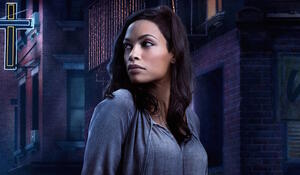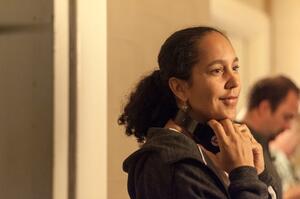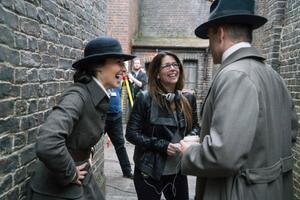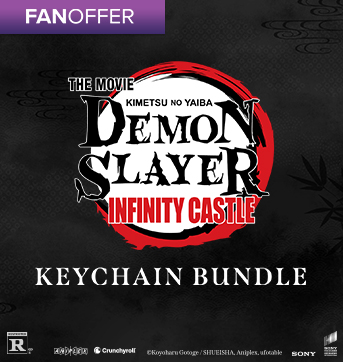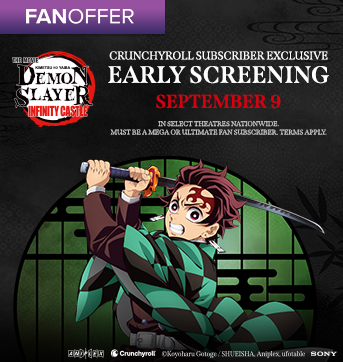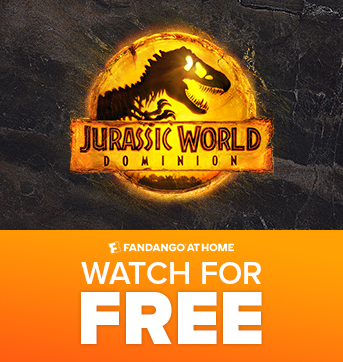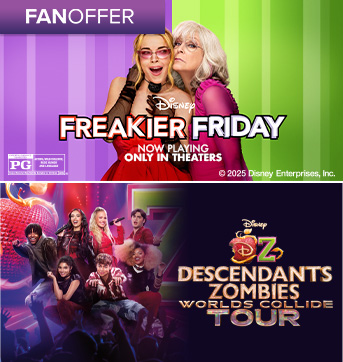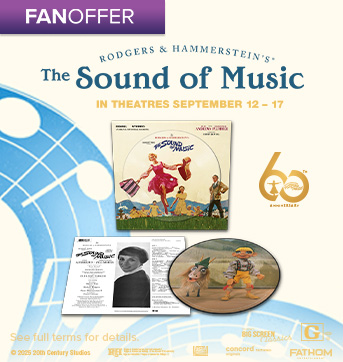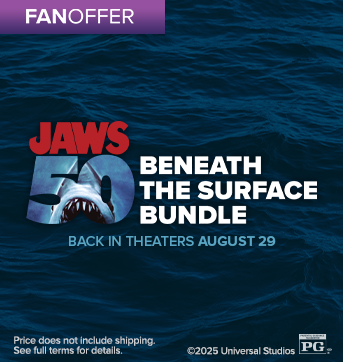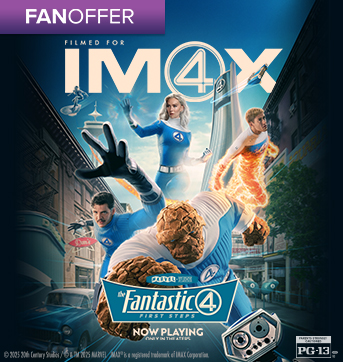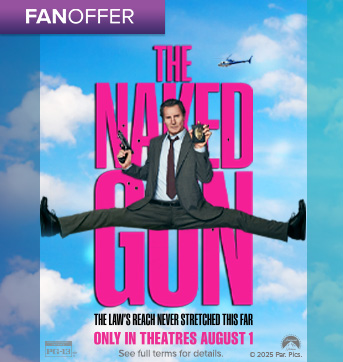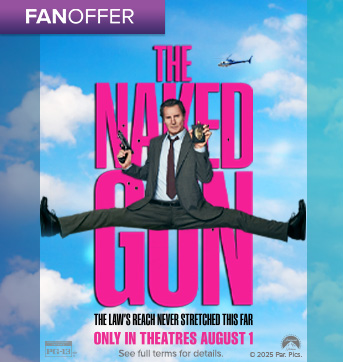
Duncan Jones is exhausted. He’s just spent the last three years of his life making Warcraft, the massive adaptation of the phenomenally popular series of video games created by Blizzard Entertainment over the past two decades. After directing the smaller, more character-driven sci-fi thrillers Moon (which he also wrote) and Source Code, Jones has taken the leap into blockbuster filmmaking with possibly the most formidable project he could have landed.
Not only did he have to find a way to boil 20 years of mythology down to two hours, but he also had to bring the fantasy worlds of Azeroth and Draenor -- along with their human and orc inhabitants -- to life in as realistic a way as possible. In telling the story of the battle between orcs and humans for the idyllic planet Azeroth, Jones wanted the orcs -- played by actors like Toby Kebbell and Clancy Brown -- to feel as real and even empathetic as the humans, which required groundbreaking facial and motion capture work that has never been seen before.
Fandango spoke with Jones exclusively about the challenges of bringing this classic game to the screen, why being a gamer himself helped the cause, and more.
Fandango: You were a fan and a gamer before you were a director of the Warcraft movie. Do you think that helped give it the final push in terms of getting this out of development and onto the screen?
Duncan Jones: I think indirectly it did. I was a fan of Warcraft since it first came out in the mid ‘90s. I think I had an awareness and an understanding of what Warcraft was, being a fan… they’ve been trying to make a Warcraft movie for nearly 10 years. Obviously there were some well-known directors attached, like Sam Raimi, of course, and they just had never quite seen what the film would be eye to eye.
Fortunately, when I came in and made my pitch I did it as a fan, and I think that sort of resonated. My particular interpretation of what Warcraft was resonated with what Blizzard saw it as, as well.
Fandango: Your first two films were also very personal films in different ways. What gives this the personal touch for you?
Jones: I think there are a lot of families in Warcraft. There’s Durotan and his pregnant wife. There’s King Llane and Lady Taria and their children. There’s Lothar and his son and the relationship between them. There’s Lothar and his sister Lady Taria. So I think the whole idea of family dynamics and that sort of familiarity between the characters is something which really appealed to me, and something I tried to inject into the movie.

Fandango: Did you go back and look at other video game adaptations to see what worked and what didn’t work?
Jones: No. [Laughs] No. I stayed away from it. As a person who has played games most of their life, I was frustrated as anyone when these films were not successful or didn’t seem to care about what made the experience enjoyable for people who did play the game. To try and replicate the direct experience of playing a game in the movie, I think you’re going down a difficult path.
But I think you take what works and make a great film. Make a film that you actually want to watch, because they are two very different mediums. I had the chance to work in the games industry as well as in film. I worked as an assistant games designer in London for about a year and a half. And they are very, very different jobs, game design and filmmaker. You are trying to create a sandbox, even for more linear games. You are trying to create an opportunity for the audience to make as many choices that feel free when you are doing a game. And with film you are doing the absolute opposite. As a director you are trying to control the audience’s vision and what they hear and everything about their experience of the storytelling as intimately as possible. You want to control that in order to direct the story for them in a way that you know is going to present it best.
"To try and replicate the direct experience of playing a game in the movie, I think you’re going down a difficult path."
So I think when you are making a film, it really can be about almost anything if you have a great story to tell. And games are exactly the same. You can make a great film based on a game. But don’t try and think that you are going to be able to give an audience the same experience they have as playing the game.
Fandango: Do you think the Warcraft game is more cinematic than other games that have been popular?
Jones: I certainly think the storytelling is epic, not to just throw out that term. But I think they’ve been making Warcraft games for 20 years. The inciting incident is the meeting of orcs and humans, which is the story that we tell in our film. But for the rest of the 20 years it’s the repercussions of that meeting. And it’s become increasingly complex and the mythology has grown, and now it’s just this rich digital folklore that exists for anyone who’s ever played a Warcraft game.
Fandango: What were the technical and storytelling challenges?
Jones: I thought structurally it was kind of a unique challenge to tell a war story, essentially, and allow the audience to spend time and empathize with both sides of the conflict, and see protagonists on both sides and understand why they felt that they had no option than to do what they were doing.
I think that’s kind of a unique thought -- that good guys can find themselves in direct conflict and both of them can be right from their perspectives. I think you always tend to imagine, “OK. We’ve got the hero and his agenda. And anyone who’s against him must be wrong or must be the bad guy.” I like the fact that we played around with that morality.
Fandango: And from a technical standpoint, what was the biggest thing to get across?
Jones: Well, right at the start, the idea of how we were going to do the orcs, because of the way I had written the script and because we were going to be spending so much time with them, and then such intimacy. We needed a way to hold a close-up on one of our characters 10, 15, 20 seconds and have the audience completely buy into this performance by this character.

That was something that I think would have been pretty much impossible 5, 10 years ago. But the level of detail that the present generation of facial motion capture allows really does mean that someone like Toby Kebbell, or Rob Kazinsky, or Daniel Wu can give a nuanced performance and the technology does pick up everything that they do. That allows us to not rely on animators getting involved in the subtleties. I think animators can and do do amazing work. But when you get into the subtleties of facial animation that’s when you can very rapidly slip into the uncanny valley and things just start to not feel right. Then you lose people.
Fandango: We were told that you pored over everything, every aspect of the visual effects, down to the smallest detail.
Jones: That’s why I’m so tired. [Laughs]
Fandango: Is that something that’s just inherent in you no matter what the project, you have to really go over everything?
Jones: I just feel a sense of responsibility. That’s my job. I feel like my job is to know and be involved in the decision making in every area, because filmmaking is something that requires a large group of people to come together and add their talents. On a film like this you get to work with people who are absolutely phenomenal in every department. But there still has to be one vision of what it is we’re all trying to achieve. And there’s too many factors; there’s too many people involved for everyone to just be allowed to just sort of do their own thing. So I have to oversee it. I have to oversee every detail.

Fandango: Are there any Easter eggs in the movie for the hard-core gamers?
Jones: Oh my God, tremendous amounts.
[Warning: spoiler starts]
Fandango: What in particular?
Jones: One particular one would be when Khadgar basically defeats Medivh at the end of the movie and releases the Fel from Karazhan, which is the tower that they live in, there is a yellow spiral that appears around him -- it’s sort of a visual effect -- and a sound. That is sort of the animation that is used in-game to denote that someone has leveled up. That’s kind of a fun one.
[end spoiler]
Fandango: You’ve been talking about your next film, a sci-fi noir called Mute, for years. You’re finally shooting it?
Jones: Yes. It looks like it. Paul Rudd, Alexander Skarsgard, and me, and a couple of as-yet-unnamed cast members will be going out to Berlin as soon as my baby has been born and we’ve had a chance to spend a little time with my baby. We’ll be going out end of July to Berlin to start preproduction and shooting at Babelsberg and around Berlin on location. I’m very excited. Finally.
Warcraft opens in theaters on June 10.

